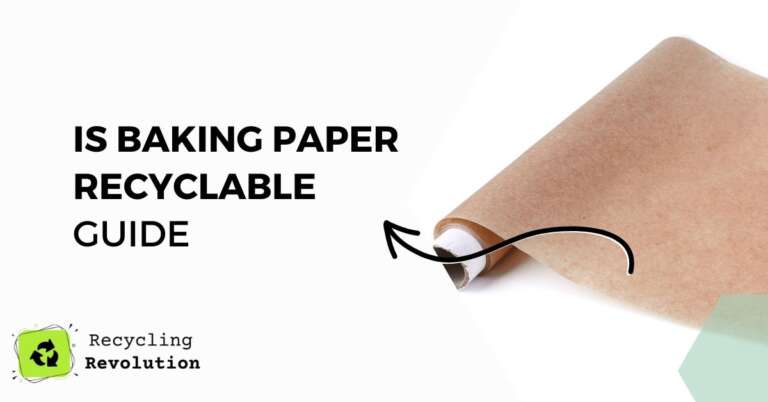Recycling is a great way to save trees, reduce the impact of landfill waste on the environment and help save costs. But is baking paper recyclable?
Baking paper is a unique material. It’s used in so many ways, and even though it’s been around since ancient times, there are still plenty of questions about its properties and uses. In this article, I’ll cover what baking paper is, what it’s made from, and how it can be recycled.
The Recyclability of baking Paper
Baking paper is a type of paper used to produce paper products such as bagasse, starch, and sugar cane. Baking papers are made from pulp fibers that have been bleached and scented. They are then chemically treated to produce stiff, waterproof paper that can be used to make bags and boxes.
Baking papers are available in various grades, including white and colored papers. These papers can be recycled at a waste facility that recycles plastic bags or at a recycling plant that recycles other materials like metal cans and aluminum foil.
Can Baking Paper Be Recycled?
Yes, baking paper can be recycled. It’s a good choice because it’s made from a material that is easy to recycle and does not require special facilities. Paper products are an essential source of carbon in the environment, so we must find ways to minimize their use.
Baking paper is made from a plant-based material, making it easily recyclable. If you have any questions about the recycling of your baking paper, contact your local council or waste management company for advice.
How Do You Dispose of Baking Paper?
Baking paper is a product that can be reused. Baking paper is made from recycled paper pulp and cardboard. It can be used to line the inside of baking sheets, or it can be used to wrap the baked goods.
When you’re done with the baking paper (or if you’re not sure), you have several options for disposing of it:
Recycle it – Check with your local recycling center to see whether they will accept your baking paper for recycling. They may charge a fee for accepting this material, but it’s worth checking first.
Compost it – If your local composting facility accepts kitchen waste, you can use the parchment-type wrapping paper to line compost bins or other composting receptacles in your yard or garden. Just make sure to cover all food scraps so no animals can get into them and make a mess.
Dispose of it at home by throwing away in the garbage can – Once you’ve finished using baking paper, simply throw it away in a garbage bin together with other household trash (not recyclables).
Alternative Uses Of Baking Paper
Baking paper, also known as parchment paper, has a variety of uses beyond just baking. Some alternative uses include:
- Cooking: Use it to line pans when roasting or baking foods to prevent sticking and make clean-up easier.
- Freezing: Use it to wrap food for freezing to prevent freezer burn.
- Steaming: Use it to create a pouch for steaming food.
- Rolling out dough: Use it to roll out the dough, eliminating the need for extra flour.
- Non-stick surface: Use it to line a surface for tasks such as kneading dough or making candy to prevent sticking.
- Covering: Use it to cover bowls or dishes to prevent splatters in the microwave.
- Strainer: Use it as a makeshift strainer for draining liquids or straining solids.
- Arts and Crafts: use it as a template or stencil for arts and crafts projects.
- Firestarter: Crumble it and use it as a fire starter for camping or fireplaces.
- Cleaning: Use it to clean hard-to-reach spaces like the inside of a vase or a small jar.
Additional Tips
When recycling baking paper, it is essential to consider safety and legal guidelines to ensure the process is done correctly and responsibly. Here are a few tips to keep in mind:
Check local guidelines: Each community has different recycling guidelines, so it is essential to check with your local recycling center to see if they accept baking paper and if there are any specific guidelines to follow.
Remove food residue: Before recycling baking paper, remove any food residue or grease. Recycling facilities do not accept soiled paper products, as they can contaminate the recycling stream.
Avoid mixing materials: When recycling baking paper, make sure to keep it separate from other materials, such as aluminum foil or plastic wrap. Mixing materials can cause problems with the recycling process and reduce the quality of the end product.
Keep it dry: Make sure to keep the baking paper dry before recycling. Wet paper can cause problems with the recycling process and can also be a breeding ground for bacteria.
Know The Material: Some baking papers are not made from pure cellulose and may contain plastic or other non-recyclable materials. It is essential to check the packaging or contact the manufacturer to know the material before recycling.
Frequently Asked Questions
Is waxed baking paper recyclable?
No, waxed baking paper is not typically recyclable because the wax coating cannot be removed during the recycling process.
How can I recycle baking paper?
Check with your local recycling program to see if the baking paper is accepted. If so, ensure it is clean and free of food residue before placing it in your recycling bin.
Are there any alternatives to using baking paper?
There are several alternatives to using baking paper, such as silicone baking mats, parchment paper, aluminum foil, or a well-oiled baking sheet.
Conclusion
Not all recycling facilities will accept baking paper, so you’ll want to double-check first. There are other options for composting too. You can place it in your trash bin or even burn it in your yard—but both of these options will require a permit from your municipality. But if you have no alternative, we hope you’ll at least try to compost the paper to further reduce your environmental impact.

